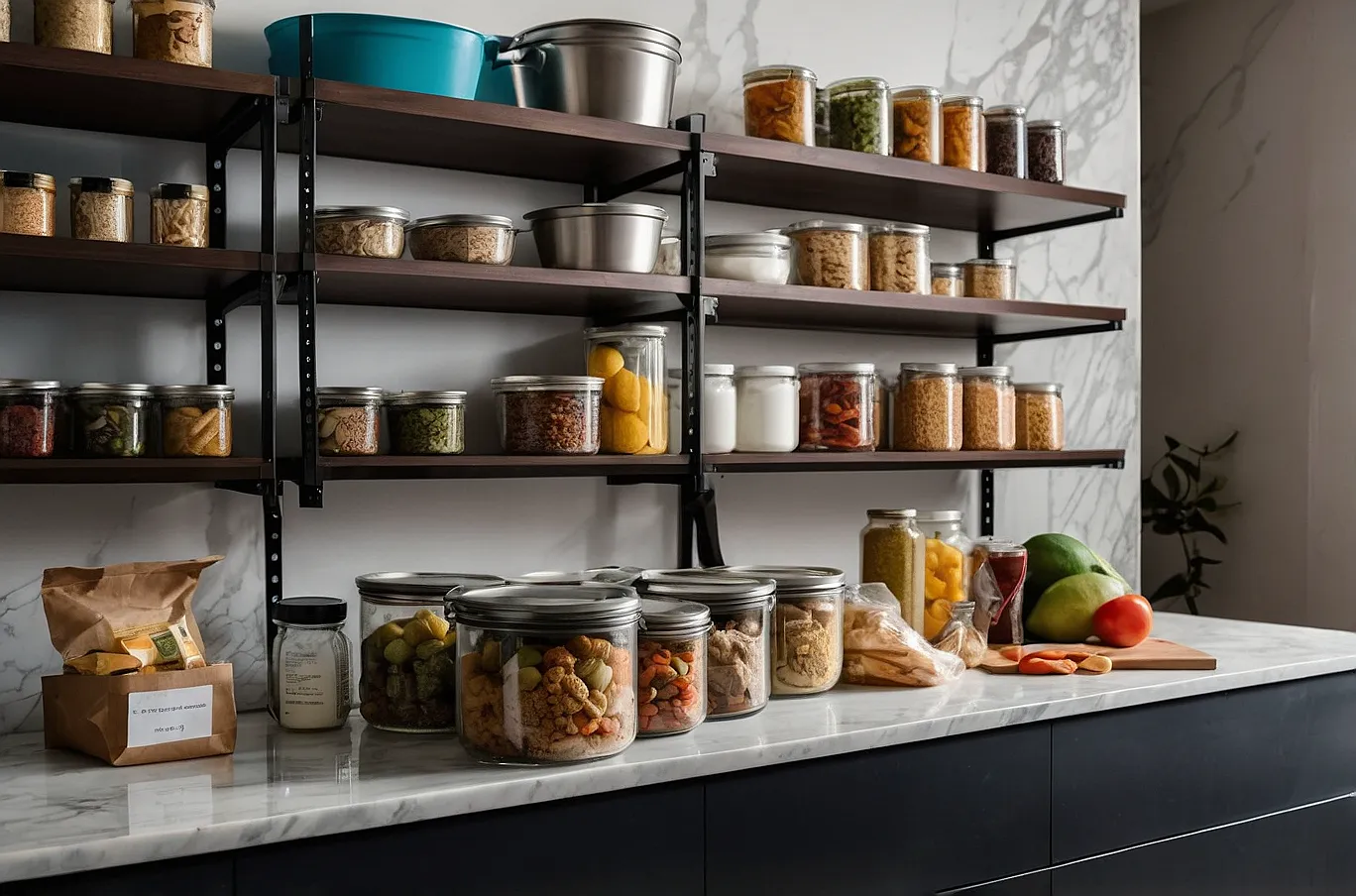 Other
OtherStress-Free Meal Planning Solutions for Single Moms
Being a single mom is a demanding role, juggling work, childcare, household chores, and everything in between. The thought of adding meal planning to an already overflowing plate can feel like just another source of stress. Yet, providing nutritious, home-cooked meals for your children is a priority, and the constant question of "What's for dinner?" can be exhausting. This is where embracing Stress-Free Meal Planning Solutions for Single Moms becomes not just a convenience, but a necessity for maintaining sanity and fostering healthy eating habits for your family. Imagine reclaiming precious evenings, reducing grocery bills, and knowing that healthy, delicious meals are always within reach.
The Single Mom's Struggle: Why Meal Planning Feels Overwhelming
The daily grind of single motherhood often leaves little room for elaborate culinary endeavors. Many single mothers face unique challenges that make consistent meal preparation seem like an insurmountable task. It’s not just about cooking; it’s about the mental load of planning, shopping, and execution.
Time Scarcity: The Ultimate Constraint
From school drop-offs and pickups to after-school activities, work deadlines, and bedtime routines, a single mom's day is a relentless race against the clock. The idea of spending hours in the kitchen after a long day is often a non-starter. This time scarcity often leads to reliance on quick, less healthy takeout options or repetitive, uninspired meals, contributing to mealtime burnout.
Budget Constraints: Making Every Dollar Count
For many single-parent households, financial resources are tight. Impulse purchases, food waste from forgotten ingredients, and frequent dining out can quickly deplete a budget. Effective meal planning isn't just about saving time; it's a critical strategy for making your grocery budget stretch further and ensuring you're getting the best value for your money. Crafting a budget-friendly meal plan can significantly reduce financial stress.
Setting the Foundation: Mindset and Meal Planning Basics

Before diving into recipes and grocery lists, it's essential to shift your perspective and build a sustainable routine. Approaching meal planning with a positive, realistic mindset is half the battle won. Remember, perfection isn't the goal; consistency and progress are what truly matter.
Embracing Imperfection and Flexibility
Your meal plan doesn't have to be rigid. Life happens, and flexibility is key. If a planned meal doesn't work out, don't stress. Have a backup plan, like frozen pre-prepped meals or easy pantry staples. The aim is to create a framework that supports you, not a strict set of rules that adds pressure. Think of it as a guide, not a dictator.
Essential Tools for Streamlined Meal Planning
Having the right tools can make a significant difference. This doesn't mean expensive gadgets, but rather simple items that organize your thoughts and your kitchen. Consider a whiteboard for weekly menus, a dedicated notebook for grocery lists, or a meal planning app. An organized kitchen routine starts with organized planning.
Strategies for Stress-Free Meal Planning Success
Now, let's get into the actionable strategies that can transform your mealtime chaos into calm. These techniques are designed to save you time, money, and mental energy, making the process of feeding your family less of a chore and more of a joy.
Batch Cooking and Freezer-Friendly Meals
One of the most powerful strategies for busy single moms is batch cooking. Dedicate a couple of hours on a less hectic day (perhaps Sunday afternoon) to cook larger quantities of versatile ingredients or entire meals that can be portioned and frozen. Think about cooking a large batch of shredded chicken, ground beef, or roasted vegetables that can be used in multiple easy weeknight dinners throughout the week or even next. Freezer-friendly meals like casseroles, soups, and stews are also excellent options. This proactive approach significantly cuts down on daily cooking time.
Mastering the Art of Repurposing Ingredients
Don't just batch cook; think about how those cooked components can be transformed. Leftover roasted chicken can become chicken tacos one night, chicken salad sandwiches for lunch, and part of a stir-fry another night. This saves you from cooking completely different meals from scratch every day and introduces variety without extra effort. It’s a smart way to ensure nutritious family meals are always available.
Simplified Grocery Shopping and Inventory Management
Efficient grocery shopping is a cornerstone of effective meal planning. Before you even leave the house (or open your delivery app), know exactly what you need based on your meal plan. Take inventory of your pantry, fridge, and freezer to avoid buying duplicates and to utilize what you already have. This minimizes food waste and keeps your budget in check.
Leveraging Online Grocery Services and Pickup
For single moms, time is gold. Online grocery shopping with pickup or delivery services can be a game-changer. It eliminates impulse buys, saves travel time to the store, and allows you to build your cart throughout the week as you plan your meals. This streamlined approach makes grocery runs less of a burden.
Nutritious Meals on a Budget: Smart Choices for Single Moms

Eating healthy doesn't have to break the bank. With a bit of planning and smart choices, you can provide wholesome, delicious meals without overspending. Focusing on whole, unprocessed ingredients and making strategic swaps can significantly impact your budget and your family's health.
Prioritizing Affordable, Nutrient-Dense Foods
Opt for pantry staples like rice, pasta, beans, lentils, and oats, which are inexpensive and versatile. Buy seasonal fruits and vegetables, as they are typically cheaper and at their peak flavor. Frozen fruits and vegetables are also excellent budget-friendly alternatives, offering similar nutritional value without spoilage concerns. When it comes to proteins, consider eggs, canned tuna or chicken, and less expensive cuts of meat that can be slow-cooked or braised to tenderness. These are all part of creating budget-friendly recipes.
Here are some examples of affordable, nutrient-dense foods:
- Legumes (beans, lentils, chickpeas)
- Whole grains (oats, brown rice, whole wheat pasta)
- Seasonal produce (carrots, potatoes, apples, bananas)
- Eggs
- Canned fish (tuna, salmon)
- Frozen vegetables (broccoli, spinach, corn)
Meal Themes and Rotation for Variety
To avoid mealtime boredom and simplify planning, consider establishing meal themes for each day of the week. For example, "Meatless Monday," "Taco Tuesday," "Pasta Wednesday," "Soup/Salad Thursday," "Pizza Friday," "Slow Cooker Saturday," and "Leftover Sunday." This framework reduces decision fatigue and helps you rotate through different cuisines and ingredients, ensuring a balanced diet and healthy eating habits.
Time-Saving Tips and Tricks for Busy Weeknights
Even with the best meal plan, weeknights can be chaotic. Having a repertoire of time-saving techniques can mean the difference between a homemade meal and a last-minute takeout order. These tips are designed to get nutritious food on the table faster.
Harnessing the Power of Kitchen Appliances
Your slow cooker, Instant Pot, and air fryer are your best friends on busy weeknights. A slow cooker can have dinner ready by the time you walk in the door, while an Instant Pot cooks meals in a fraction of the time. An air fryer is perfect for quick roasted vegetables or crispy proteins. Learning to maximize these tools will be a game-changer for time-saving meal prep.
Quick-Prep Recipes and One-Pan Wonders
Focus on recipes that require minimal chopping, few ingredients, and easy cleanup. One-pan or one-pot meals are fantastic for this, as everything cooks together, reducing the number of dishes. Sheet pan dinners, pasta dishes cooked in one pot, and simple stir-fries are excellent examples of quick and healthy options that are perfect for balancing work and home responsibilities.
Getting the Kids Involved: Fun and Practical Benefits

Involving your children in the meal planning and preparation process not only lightens your load but also teaches them valuable life skills and encourages healthier eating habits. Even toddlers can help in small ways, and older children can take on more responsibility.
Age-Appropriate Tasks for Little Helpers
Even young children can wash vegetables, stir ingredients, or set the table. Older children can help with chopping, measuring, or even preparing simple components of a meal. Giving them a sense of ownership in the process makes them more likely to eat what's served. This can transform meal prep into a fun family activity rather than a solitary chore for you. It's a great way to bond while building healthy eating habits.
Here are some ideas for involving kids:
- Toddlers: Washing produce, stirring ingredients in a large bowl, setting napkins.
- Preschoolers: Tearing lettuce, snapping green beans, mashing soft ingredients, stirring, helping set the table.
- School-aged children: Measuring ingredients, simple chopping (with supervision), reading recipes, packing lunches, making salad.
- Teens: Planning meals, grocery shopping, cooking entire meals, experimenting with new recipes.
Encouraging Healthy Eating Habits Through Participation
When children are involved in choosing and preparing meals, they are often more open to trying new foods and developing a positive relationship with food. It's an opportunity to teach them about nutrition, where food comes from, and the importance of balanced meals. This shared experience fosters a sense of teamwork and responsibility within the family.
Maintaining Momentum: Long-Term Meal Planning Success
Consistency is key to making meal planning a sustainable habit. It's not about being perfect every week, but about continuously refining your process and adapting to your family's evolving needs. These strategies will help you stay on track and make meal planning a natural part of your weekly routine.
Regularly Reviewing and Adjusting Your System
At the end of each week, take a few minutes to review what worked well and what didn't. Did a particular recipe fall flat? Did you overbuy a certain ingredient? Was one night particularly stressful? Use these insights to refine your next week's plan. Perhaps you need more quick-prep meals, or maybe you can incorporate more batch cooking. This continuous improvement loop is vital for long-term success with your stress-free meal planning solutions for single moms.
Building a Recipe Database of Family Favorites
As you discover recipes your family loves, add them to a personal database. This could be a digital document, a Pinterest board, or a physical binder. Having a go-to list of tried-and-true recipes simplifies the planning process immensely, especially on weeks when you're feeling uninspired. This collection of easy weeknight dinners will be your lifeline.
Beyond the Plate: The Ripple Effect of Smart Meal Planning
The benefits of implementing stress-free meal planning solutions extend far beyond just having dinner on the table. They impact your overall well-being, your children's health, and the harmony of your home. It’s an investment in yourself and your family.
Reduced Stress and Increased Family Time
When meal planning is no longer a daily struggle, you free up significant mental bandwidth. This reduced stress means you have more energy and patience for your children, leading to more quality family time. Instead of rushing through dinner prep, you can enjoy conversations, help with homework, or simply relax together. This is the essence of balancing work and home.
Improved Health and Financial Savings
Consistently eating home-cooked, nutritious meals leads to better health outcomes for both you and your children. You control the ingredients, reducing processed foods and unhealthy fats. Furthermore, by planning and shopping wisely, you significantly cut down on expensive takeout and food waste, leading to substantial financial savings over time. These savings can be redirected to other important areas of your life.
Implementing Stress-Free Meal Planning Solutions for Single Moms might seem daunting at first, but by taking small, consistent steps, you can transform your approach to feeding your family. Embrace batch cooking, simplify your grocery trips, involve your kids, and leverage your kitchen tools. You'll not only save time and money but also gain peace of mind, knowing that you're providing healthy, delicious meals while managing the many demands of single parenthood. Start small, celebrate every success, and enjoy the delicious benefits of a more organized kitchen and a calmer home.
